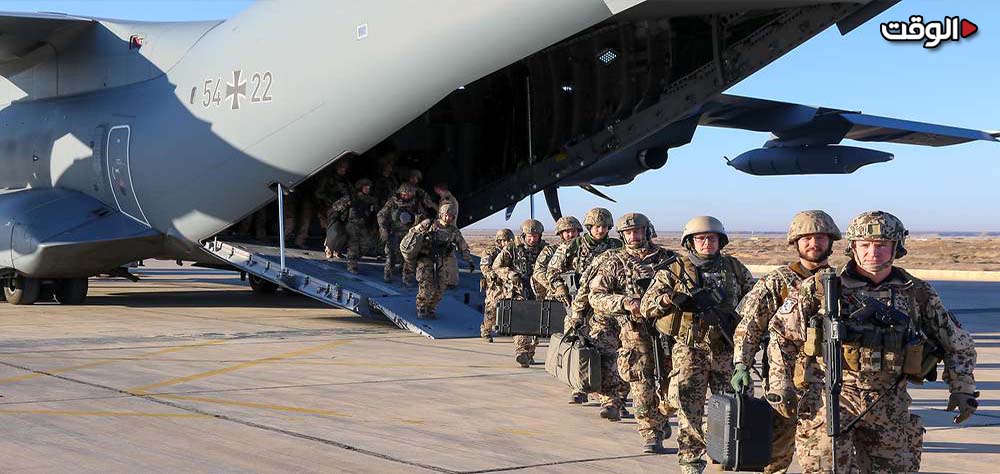Alwaght- At a time West Asia conditions are highly destabilized and tense, some sources talk about an American decision to deploy more troops to the region. CBS News reported that the US will send 1,500 forces to Syria and Iraq under the cover of fight against terrorism. The deployment of these forces to the region comes within ‘Operation Inherent Resolve’ against ISIS terrorist group in Syria, Iraq, and Libya that is claimed to fight the group and defend the US military bases.
Number of the US forces in the region
In 2023, a large number of American forces were dispatched to West Asia under the excuse of Operation Inherent Resolve. In the second half of last year, the Pentagon sent 2,500 troops to Syria and sent more than 900 troops to Iraq on two separate dispatches.
According to a report by Axios news website, by October 2023, the number of US military forces in the region reached 45,000. 13,500 American troops are stationed in Kuwait, and this Persian Gulf emirate hosts the largest number of American troops in the region. After Kuwait, Bahrain with 9,000 and Qatar with 8,000 troops host the largest number of American military personnel in the region.
Also, 2,500 troops are estimated to currently be stationed in Iraq, distributed in the center and the north.
The US defying the Iraqi people
American sources talk about increasing troops in Iraq while over the past few years, Iraqi government and people have called for US military withdrawal. Last week, Iraqi Prime Minister Mohammed Shia al-Sudani said that Baghdad wants “regular dialogue” with the US for quick withdrawal of the Western coalition. In an interview with Reuters last week, al-Sudani said foreign forces are the source of instability in the region amid consequences of Gaza war, adding that Iraq is yet to set an ultimatum for the pullout. However, he said, a demand was officially made to Washington.
Also, two weeks ago, Karim Al-Mohammadawi, a member of the Iraqi parliament’s Foreign Relations Commission, called for the use of force and public demonstrations to expel American troops from Iraq. On the other hand, not long ago, Hadi al-Amiri, the secretary-general of the Badr Organization, issued a statement asking the Iraqi government to take all the necessary measures to determine a short-time timetable for the withdrawal of the American-led Western coalition from Iraq.
“As long as the coalition forces are present in this country, no one expects the military power of the Iraqi army and other security institutions to be upgraded,” he maintained.
American justification for continuation of presence in Iraq
The American forces are still stationed in Iraq amid Washington’s contradictions regarding the nature of their presence. The Americans sometimes declare that the purpose of this presence is to help and consult, and sometimes they say they are there to carry out military operations, which are seen as suspicious.
In fact, despite the fact that there are many requests for the US military withdrawal from Iraq, the US is trying to continue its military presence in this country. Pentagon Press Secretary General Patrick Ryder said in a press briefing last week that “right now, I’m not aware of any plans (to plan for withdrawal). We continue to remain very focused on the defeat ISIS mission.” He continued that he was not aware of Baghdad’s demand from the US Department of Defense about exit of the American forces, and referred reporters to the US State Department for information on any diplomatic talks in this regard.
Will Iraq be destabilized?
The US presence in Iraq continues under the cover of protection of security in the region, but over the past years, Americans have undermined regional security despite obliteration of ISIS.
Also, experience of the past years has well shown that the Iraqi government is individually capable of protecting the security and that the American presence only causes instability. Further recruitment of Iraqi army and purchase of weapons in recent years has improved the readiness of the armed forces to an acceptable level. During various events in Iraq, like the multi-million Arbaeen congregation, the army very well protects security.
Actually, the highest rate of insecurity in Iraq is in areas where American forces have extensive presence. In other words, Americans are source of instability in these regions. Mahdi Zakeryan, an expert of regional affairs, says: “The thing is that Americans should understand that regional issues are not separate, rather, they are comprehensive. You cannot go into a region and support a specific entity called Israel while Palestinians, Iraqis, and Yemenis do not matter to you.”



























